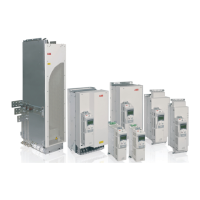38 Planning the cabinet installation
• The cabinet must have enough free space for the components to ensure sufficient
cooling. Observe the minimum clearances given for each component. For the required
free space around the drive module, see page 39.
• The heat dissipated by cables and other additional equipment must also be ventilated.
• The air inlets and outlets must be equipped with gratings that:
• guide the air flow
• protect against contact
• prevent water splashes from entering the cabinet.
• The drawing below shows two typical cabinet cooling solutions. The air inlet is at the
bottom of the cabinet, while the outlet is at the top, either on the upper part of the door
or on the roof.
• The internal cooling fans of the drive modules and reactors/chokes are usually
sufficient to keep the component temperatures low enough in IP22 cabinets.
• In IP54 cabinets, thick filter mats are used to prevent water splashes from entering the
cabinet. This entails the installation of additional cooling equipment, such as an
exhaust fan.
• See page 112 for:
• allowed temperature rise inside the cabinet
• allowed pressure drop over the cabinet that the module fan can overcome
• air inlet and outlet sizes required for the module cooling and recommended filter
material (if used).

